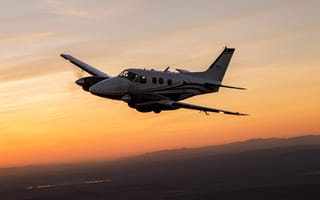
Merlin Labs, a Boston startup developing technology that allows airplanes to fly autonomously, is emerging from stealth after nearly three years to announce a 55-aircraft partnership with Dynamic Aviation, the largest operator of King Air planes in the world.
The company also announced Wednesday that it has raised $25 million in fresh funding, consisting of a $3.5 million seed round led by First Round Capital and a $21.5 million Series A led by GV (formerly Google Ventures). Co-founder and CEO Matt George says all the money will be used to hire engineering talent, with the goal of doubling Merlin Labs’ headcount in the next six or seven months.
Merlin Labs is based out of Boston and has offices in Los Angeles, Denver and New Zealand, as well as a dedicated flight facility in the Mojave Desert (where George was speaking to Built In from). George added that the majority of the company’s hiring will be done in Boston, though, citing the city’s leading aerospace program, universities and various other robotics companies as big attractors for talent.
“Boston’s home, Boston’s where we’re building. For us, it’s really important to see companies start in Boston and stay in Boston,” George told Built In. “We’re proud to continue Boston’s tradition of building truly world-changing robotics companies.”
Merlin Labs has spent the last several years building hardware and software that enables complex, fixed-wing aircraft to fly autonomously. The company says it has performed hundreds of missions for multiple aircraft types, with a focus on on-board autonomy rather than remote piloting. Although there is a human pilot monitoring from the ground who can take over in case of emergency, the plane is retrofitted with Merlin Labs’ tech to operate on its own.
This partnership with Dynamic Aviation is the first public implementation of Merlin Labs’ technology. Flight trials are currently underway in the Mojave.
Merlin Labs is starting with a fleet of 55 King Air cargo planes, but George says this technology can have a “pretty wide variety” of uses in the near future, including urban air mobility. When asked if this technology could be applied to, say, a domestic Delta flight, George said there are “many, many, many steps to go” before we get to that point.
“There’s a pretty long time period that needs to go by with, like, pretty ubiquitous cargo flights before anything happens on the passenger side,” George said. “But yeah, that’s definitely somewhere on the roadmap.”
In the meantime, Merlin Labs will continue applying its technology to cargo planes, and is in the midst of getting certification from the U.S. Federal Aviation Administration to be able to take to the skies for commercial services.
Once it is certified, George said Merlin Labs’ technology will be a game changer. After all, big freight providers like UPS and FedEx are having to move billions of packages around the world every day for consumers that expect their goods to be delivered as quickly as possible — and these demands have gotten even more intense amid the pandemic. Accomplishing this requires an “insane logistics chain,” as George puts it, that relies on air freight in some form or another.
In order to continue meeting these skyrocketing demands, George says these companies will need to be able to deploy their aircraft more efficiently and affordably without the constraints of human pilots. Merlin Labs’ autonomous flight technology could be an ideal solution.
“The way we are deploying things up into the skies fundamentally hasn’t changed since the 1950s. Now we are leading the pack to define what the next 100 years of aerospace looks like,” George said. “I’m sitting out here in the middle of the Mojave Desert after showing a customer an aircraft that was able to fly all on its own. When we certify the technology and when we continue to bring it to market, it will fundamentally change the way the world works. It’s really rare to be given the opportunity to work on an incredible problem that can touch nearly everyone in the world in a positive way.”




